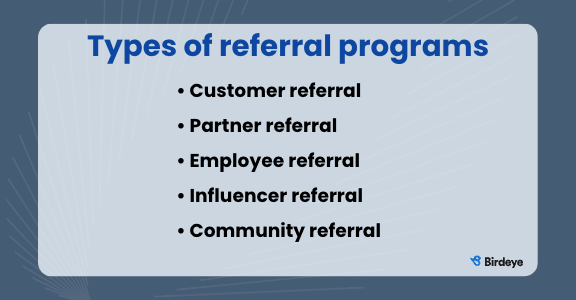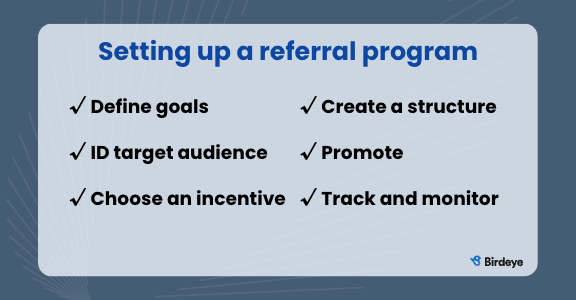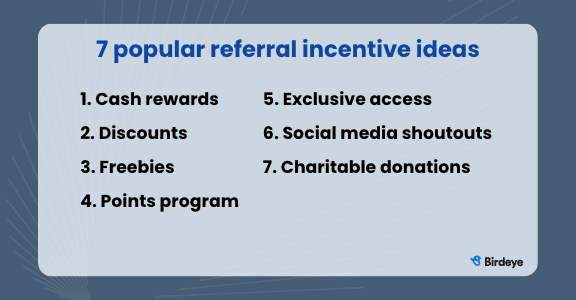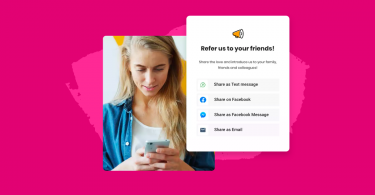If you’re looking to implement a referral program for your business, you need some creative inspiration and brilliant customer referral program ideas. You also need to know what goes into an effective referral program as well as how to ensure it gets out to the right people.
In this article, we look at everything you need to know about referral programs. And we’ll share creative referral program ideas you can use as inspiration for creating your own engaging referral strategies.
Table of contents
Do referral programs work?
According to research, up to 78% of marketing experts agree word of mouth is the ultimate strategy to get more leads. Another resource found that customer referral programs can bring an average of 20,000 email addresses per month.
There is an abundance of evidence suggesting that referral programs truly work. Many marketers agree it’s one of the most effective ways to promote a business.

Types of referral programs

Before diving into referral program ideas you can use, let’s refresh your understanding of the various types of referral programs.
Customer referral
Your existing customer base is one of your most valuable marketing and sales resources when it comes to referrals. That’s why in this type of referral program, a business incentivizes its existing customers to refer new customers. Referral rewards can come in the form of promotions, discounts, or other types of incentives.
If they’ve agreed to receive communication from you, reach out to your customers with these referral opportunities. Happy customers can then share your business with their friends and family.
Partner referral
Partner referral programs involve a company partnering with another business where there are mutual benefits and share a similar target audience. The partner business refers its customers to your company in exchange for financial compensation.
Assess your current partnerships and seek to collaborate with local businesses or associations that can provide access to untapped audiences. It’s an effective way to broaden your reach and attract new customers. Get a partner to share about your business on social media, in their email campaigns, on their blog, or on their website. The more your company is out there, the likelier a customer can find you.
Employee referral
In an employee referral program, a company incentivizes its existing staff to refer qualified candidates for job openings. Employees enjoy perks like monetary bonuses or company swag in return for their candidate referrals.
Your employees can be great sources when it comes time to fill new openings and critical roles. If you have employees that are especially excited about your company and its culture, or if you have an incentivized referral program in place, you can count on them to share their positive working experience with others.
When it comes to getting your team on board with a candidate referral program, knowledge is power. The more your employees know about your company and your mission, the better.
Influencer referral
Social media influencers can drive significant traffic to a business by referring their followers. When you can create a referral program with successful influencers, you can gain access to a wider audience with minimal effort.
Social media influencer marketing has grown in popularity in the last 15 to 20 years. According to research, 92% of marketers believe that influencer marketing is effective.
Influencers have access to large, engaged audiences that are hungry for their ongoing content. 50% of Millennials trust product recommendations from influencers. The right influencer partnership can lead to significant exposure for your business. And delegating an influencer who already commands a sizable audience to promote your offerings can be game-changing.
Community referral
In a community referral program, businesses partners with a community organization, usually a charity or local sports team. There are various organizations in your community, including non-profits, religious organizations, professional sports teams, and social clubs, just to name a few.
If there is alignment between your business and one of these groups within the community, and they have access to an audience that would benefit from your products and services, you can strike up a partnership. You can have them share your business with their members in exchange for a donation or a percentage of sales.
Setting up a referral program

Define goals
Identify what you would like to accomplish with your referral program. For example, most businesses look to increase growth and revenue as a goal. But you can also think about longer-term goals like customer engagement and retention. No matter your goals, define them in crystal clear terms. Checking performance against goals is how you can measure the effectiveness of your referral program.
Identify the target audience
Determine who is a great candidate as a “referrer” for your program. You can look at all your customers. But it could also be for specific segments of customers, like repeat customers versus first-time buyers. Knowing who you’re targeting will streamline your processes and make you more effective overall. If you’re clear on who your referral program is for, you can create the necessary actions and structures that’ll lead to desired outcomes.
Choose an incentive
Many types of incentives can appeal to your customers. Some referral incentive ideas include discounts, promotions, points, free products, and more. Consider why your customers will refer you and align your program with the benefits they’re interested in receiving. This will ensure they’re motivated to refer as many people as possible.
Create a referral program structure
In creating your structure, it’s important to take inventory of the following:
- What are your goals?
- What guidelines do you need to put in place?
- Who are you sharing your referral program with?
- How are you planning to follow up with them?
- What are the incentives?
- How are you going to promote the program?
These are important distinctions that’ll help you set up a referral program your audience will get excited about. It also ensures you facilitate the program that makes sense logistically.
For instance, if you plan to share your referral program using QR codes, you’ll want to verify that your target audience has access to smartphones and knows how to use QR codes.
Promote the referral program
There are many ways to promote your referral program. Look at the marketing channels and platforms you’re already using and which are proving effective. For effective advertising to a specific customer segment, make sure you have sufficient knowledge about their customer profile. This is imperative to customize your message and appeal to their interest. Use your blog, website, social media, email list, and print materials to get the word out.
Track and monitor referrals
Tracking metrics like who was referred and by whom, when they were referred, whether they took the offer, and your follow-up efforts is important. A customer relationship management (CRM) solution can simplify the process of tracking all relevant details.
Tracking and monitoring referrals will tell you much of what you need to know about how effective your program is. It’ll also allow you to make improvements and adjustments as the preferences of your “referrers” change.
7 popular referral incentive ideas

Use these referral program ideas to ensure your customers are credited with, and rewarded for, their referrals.
- Cash rewards: Most people are looking for opportunities to earn a bit of cash on the side, and cash-based rewards can be very attractive.
- Discounts: Customers who enjoy your products and services will naturally return for more. Discount-based incentives will see them coming back and spending more with you. You benefit from the patronage of the existing customers and from those they’ve referred.
- Free products or services: Giving away freebies can be very effective for encouraging referrals, especially for companies with consumable products that need to be performed frequently, like haircuts or car maintenance.
- Points program: From grocery stores to high-end retailers, companies often establish points programs rooted in referrals. Customers can accumulate points and earn discounts on purchases. And if they collect enough points from referring, they get free products and services in return.
- Exclusive access: You can also give your customers access to sneak previews of new products and services, private Facebook groups, online memberships, VIP experiences, and more. People like to feel like they are on the inside, and exclusive access can motivate referrers in a big way.
- Social media shoutouts: There are many people looking to grow their social media following. If that’s not enough, people love getting public recognition. Social media shoutouts can work as incentives depending on the age of your customer as well as the benefits they would like to receive from your business.
- Charitable donations: If you’re partnering with charities and other community initiatives, donating to their cause is a good way to incentivize the sharing of your business.
FAQs about referral program ideas
A referral program should include a clear description of your program, what the customer gets for referring your business, and the procedure for how the customer is to refer your business so they are credited for their efforts.
Four types of referrals are direct or word-of-mouth referrals, business or partner referrals, online review-based referrals, and social media referrals.
To create a referral program, determine your target audience, develop attractive incentives, create a promotional plan, and follow up with a tracking system to measure all referrals.
Boost sales with your referral program ideas
Referral programs can be simple to create and implement. Most referral marketing ideas work for most businesses. You’ll need the right people and structures to ensure you’re tracking referrals and following up with customers as necessary. But once implemented, your program should help you boost sales and brand awareness for both short and long-term success.

Originally published



